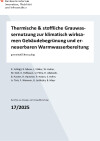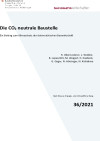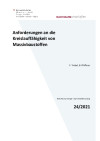Suchergebnisse
BIMstocks - Digital Urban Mining Platform: Assessing the material composition of building stocks through coupling of BIM to GIS
The main goal of BIMstocks is the development of a method for the digital capturing of the material composition of the existing building stock for follow up modelling of an Urban Mining Platform as well as for the prediction of the recycling potentials.
Vertical Farm Aspern - Demokratisierung von vertical farming unter Berücksichtigung von Parametern der Kreislaufwirtschaft
Planung, Errichtung und Optimierung einer Vertikalen Farm zur urbanen Lebensmittelproduktion, unter Einbindung der Nutzer:innen in den operativen Betrieb. Das Gebäude und das Betreiber:innenkonzept bilden dabei die gesamte Lebensmittelwertschöpfungskette ab, von der Aussaat bis zum Verkauf.
Vertical Farm Aspern - Democratization of vertical farming under consideration of parameters of circular economy
Planning, construction and optimization of a vertical farm for urban food production, involving the users in the operational management. The building and the operator concept represent the entire food value chain, from planting to selling.
The Green Parking Space – Nutzung von städtischen Verkehrsflächen für die Produktion von Biomasse
Zahlreiche Verkehrsflächen im städtischen Umfeld werden nur einen geringen Teil der Zeit tatsächlich genutzt. Inhalt dieses Projekt war, die Möglichkeit zu untersuchen, solche Flächen durch Integration von Photobioreaktoren zusätzlich zur Produktion von Biomasse zu nutzen und die Systeme möglichst vollständig in die urbanen Stoff- und Energiekreisläufe einzubinden.
The Green Parking Space – Utilization of urban parking areas for production of biomass
Many traffic areas in urban environments are actually used as such only a small fraction of the time. Subject of this project was to investigate the possibility of using those areas by additional integration of photobioreactors for the production of biomass, integrating such systems to the maximum extent into the urban substance and energy cycles.
KLIMADEMO VIS-A-VIS: Partizipative Realisierung eines klimaneutralen Demonstrationsgebäudes Vis-à-Vis
Partizipative Entwicklung eines Pilotprojekts an der Schnittstelle zwischen Klimaneutralität, Leistbarkeit und mehrgeschoßigem Holz-Wohnbau anhand fundierter Entscheidungsgrundlagen hinsichtlich nachwachsender Materialien und regenerativen Energien. Ergebnisse sind ein klimaneutrales Leuchtturm-Projekt und die Verbreitung von Wissen zu Klimaneutralität an ein größeres Publikum.
KLIMADEMO VIS-A-VIS: Participatory realization of a climate-neutral demonstration building Vis-à-Vis
Participatory development of a pilot project at the interface between climate neutrality, affordability and multi-storey wooden housing based on well-founded decision-making bases in terms of renewable materials and renewable energies. The result is a multipliable carbon neutral building and the dissemination of carbon neutrality know-how to a larger audience.
RCC – Reduced Carbon Concrete: Implementierung von CO2-reduzierten Betonen auf der Baustelle
Die Ziele des vorliegenden Projekts „RCC – Reduced Carbon Concrete“ war es, das aktuelle Wissen um die temperaturabhängigen Aushärtungsverläufe der Performancebetone durch Betonarbeiten an großen Bauteilen auf der Baustelle, unter sommerlichen und winterlichen Bedingungen, sowie in der Fertigteilproduktion zu erproben. Die Ergebnisse fließen in die Baupraxis und die Normungsarbeit ein.
RCC – Reduced Carbon Concrete: Implementation of CO2-redudes concrete in construction sites
The objectives of the present project "RCC - Reduced Carbon Concrete" were to test the current knowledge about the temperature-dependent curing processes of performance concretes by concrete work on large components on the construction site, under summer and winter conditions, and in precast production. The results will be incorporated into construction practice and standardization work.
GreenTech-Renovation - Energetische Sanierung von gläsernen Gebäuden von architektonischem Wert
Der Schwerpunkt des Projekts GreenTech-Renovation war, innovative Lösungen zur energetischen Sanierung von architektonisch wertvollen Bauten mit hohen Glasanteil zu finden. Dafür wurde ein zukunftsweisendes bauphysikalisches Konzept entwickelt, das den Einsatz alternativer Energieformen beinhaltet. Ein intelligentes Nutzungskonzept kann mit ökologischem und sozialem Engagement die energetischen Sanierungskonzepte verstärken und deren Nachhaltigkeit garantieren. Die 10-R der Kreislaufwirtschaft (Refuse, Rethink, Reduce, Reuse, Repair, Refurbish, Remanufacture, Repurpose, Recycle, Recover) dienen dabei als Leitlinie.
GreenTech-Renovation - Energetic Renovation of Glass Buildings of Architectural Value
The focus of the GreenTech-Renovation project was to find innovative solutions for the energetic renovation of architecturally valuable buildings with a high proportion of glass. A future-oriented building physics concept that includes the use of alternative forms of energy had been developed for this purpose. With ecological and social commitment, an intelligent usage concept could strengthen the energetic renovation concepts and guarantee their sustainability. The 10-Rs of the circular economy (Refuse, Rethink, Reduce, Reuse, Repair, Refurbish, Remanufacture, Repurpose, Recycle, Recover) will serve as a guideline.
greenWATERrecycling - Thermische & stoffliche Grauwassernutzung zur klimatisch wirksamen Gebäudebegrünung und erneuerbaren Warmwasserbereitung
Entwicklung eines Systems zur stofflichen und thermisch-energietechnischen Grauwasserfiltratsverwertung zur Bewässerung von Gebäude- und Fassadenbegrünungen zur Reduktion des Energieverbrauchs der Warmwasserbereitstellung und des Wasserverbrauchs von Begrünungssystemen.
greenWATERrecycling – utilization of greywater for energy recovery and for providing greywater-filtrate for watering green walls
Development of a system for energy-recovery of waste heat of greywater and of greywater-filtrate in ordert o reduce the energy consumption of hot water supply and the water consumption for irrigation.
M-DAB2: Materialintensität der Innenentwicklung - Ressourcenbewertung und Lokalisierung städtischer Entwicklungspotenziale
Bei der Bewertung von Innenentwicklungspotenzialen wurde erstmals auch die Materialintensität der Innenentwicklung (anfallende Stoffmengen) für unterschiedliche Entwicklungsvarianten berücksichtigt. Dabei wurde ein Methodenset zur holistischen Bewertung von Potenzialflächen und verschiedene Entwicklungsvarianten und -szenarien zur ressourcenschonenden Innenentwicklung geschaffen.
Thermische & stoffliche Grauwassernutzung zur klimatisch wirksamen Gebäudebegrünung und erneuerbaren Warmwasserbereitung (greenWATERrecycling)

Entwicklung eines Systems zur stofflichen und thermisch-energietechnischen Grauwasserfiltratsverwertung zur Bewässerung von Gebäude- und Fassadenbegrünungen zur Reduktion des Energieverbrauchs der Warmwasserbereitstellung und des Wasserverbrauchs von Begrünungssystemen.
Schriftenreihe
17/2025
K. Schlögl, R. Mixan, J. Völker, W. Huber, M. Gräf, K. Hofbauer, U. Pitha, R. Allabashi, B. Pucher, R. Hammer, P. Holzer, S. Hofer, A. Türk, F. Wimmer, G. Jedliczka, B. Mayr Berichte aus
Herausgeber: BMIMI
Deutsch, 112 Seiten
Downloads zur Publikation
Die CO2 neutrale Baustelle - Ein Beitrag zum Klimaschutz der österreichischen Bauwirtschaft

Identifikation aller auf Baustellen anfallenden direkten und indirekten CO2- bzw. THG-Emissionen. Analyse der Rahmenbedingungen und Technologien, um Möglichkeiten für deren Steuerung aufzuzeigen. Gleichzeitig wurden Mehrwerte wie beispielsweise Kosten- und Nutzen-Vorteile einer CO2-neutralen Baustelle aufgezeigt und quantifiziert.
Schriftenreihe
36/2021
R. Obernosterer, L. Winkler, B. Lepuschitz, M. Weigert, H. Daxbeck, G. Goger, N. Hörzinger, N. Kisliakova
Herausgeber: BMK
Deutsch, 119 Seiten
Downloads zur Publikation
BIMaterial Process Design for Material Building Pass
Building Information Modelling supported compilation of a Material Building Pass; as a qualitative and quantitative documentation of the material composition of, and the material distribution within, a building structure. This project is a central milestone towards standardized, BIM-generated building material passes.
Anforderungen an die Kreislauffähigkeit von Massivbaustoffen

Die Studie zeigt aktuelle Herausforderungen, Chancen und Potenziale in Bezug auf die Kreislauffähigkeit der Massivbauindustrie sowie die mit ihr agierenden Akteur:innen auf. Darauf aufbauend wurden zukünftige Aktionsfelder notwendiger Forschung und Entwicklung zur Förderung der Kreislaufwirtschaft im Bereich mineralsicher Baustoffe herausgearbeitet.
Schriftenreihe
24/2021
F. Trebut, B. Pfefferer
Herausgeber: BMK
Deutsch, 59 Seiten
Downloads zur Publikation
HEROES - Häuser für Energie und RessOurcenEffiziente Siedlungen
Ein vereinfachtes Verfahren für die Berechnung von ökologischen Kennzahlen für bisher nicht betrachtete Gebäudeteile (thermisch nicht relevante Bauteile und Haustechnikkomponenten) wird entwickelt. Die methodischen Grundlagen für die Berechnung der Primärenergie u. der CO2-Emissionen im Betrieb und in den verbauten Materialien werden harmonisiert.
3D*3B - 3D-Betondruck und Bewehrung für emissionsarme biegebeanspruchte Tragstrukturen des Hochbaus
Interdisziplinäres Projekt zur Integration von 3D-Betondruckelementen in vorwiegend biegebeanspruchte Tragstrukturen mit dem Ziel der nachweisbaren Reduktion von klimarelevanten Emissionen im Baubereich. Die Ergebnisse dienen der umfassenden Beurteilung technischer, logistischer und klimarelevanter Aspekte.
